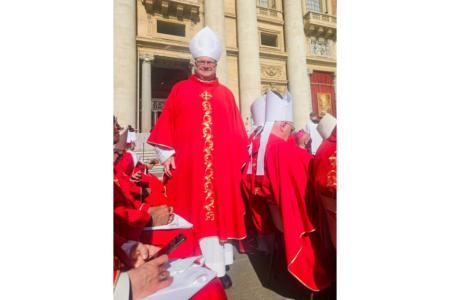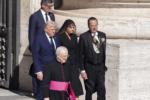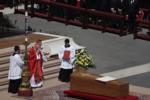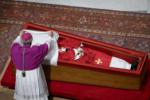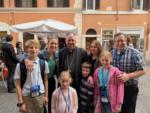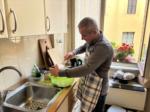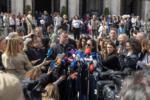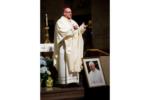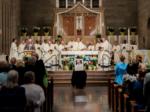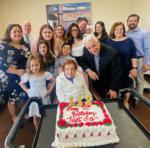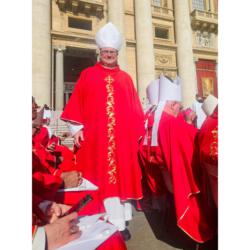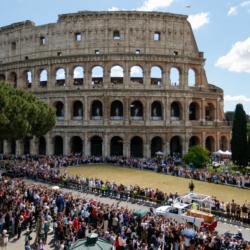Archbishop Henning reflects on 'deeply moving' papal funeral
(Shortly after the funeral Mass for Pope Francis held in St. Peter's Square on April 26, 2025, Archbishop Richard G. Henning spoke to The Pilot from the Pontifical North American College in Rome to share his reflections on the experience. The interview has been edited for length, content and clarity.)
Question: Can you tell us about your personal experiences with Pope Francis?
Archbishop Henning: Well, the most memorable interaction that I had with him was the last. I was still a bishop in New York, and we went over for the Ad Limina visit. And it was an extraordinary two hours that we had. There were about 19 of us, I think, at the time. We had a two-hour session with him. And it started with a brief presentation by him, but then it was kind of a free-flowing conversation. And what he introduced at the start of the conversation was the idea of closeness, "cercania."
He was talking about how he wanted us as bishops to be close to the Lord, close to each other, close to the people, close to the poor. So he talked about four types of "cercania." And when we responded in the conversation to him, we said, "Well, we think there's a fifth one, and it's to you, Holy Father," because we really felt it in the room. It was very clear that everyone was very moved by his presence.
You know, it's hard to get to know a pope. You mostly see him through the lens of the media or public events. But in person, he was just so warm and personable and relaxed and chuckling and kind of making jokes. It had to be translated, but even so, the warmth came through. And I just found that it just lifted my spirit enormously because it was 2019. All that had happened in 2018 was so painful. And it was just such a beautiful thing to have that time with him and to realize how much he cared about us as his fellow bishops.
Question: Why did you decide to make the trip and be present today in Rome for the funeral? Why did you think it was important?
Archbishop Henning: In the end, it was not really thinking as much as it was impulse, just feeling like it was the right thing to do.
Cardinal O'Malley certainly influenced my thinking. He supported me in whatever decision I made, but he helped me work through whether I should. I was concerned about leaving the people that I serve during a difficult time. But I felt, because we did the three nights of memorials and I did the first, and we have auxiliary bishops, I could do this without leaving people without their shepherd. So I decided in the end it would be good to come.
So, personally, the Holy Father appointed me three times: at first as an auxiliary and as a bishop to Providence, and then to Boston. And I very much appreciate his confidence in those appointments. (It's greater confidence than I have in me sometimes, but I appreciate it!) So, I felt personally drawn to be present for this. And I don't regret that decision. It was a deeply moving experience today in the square.
Question: Could you describe your sentiment, your feelings perhaps, as you prayed in front of the casket at St. Peter's Basilica and today at the Mass?
Archbishop: This morning, before the Mass, we were given an opportunity to visit with his casket in St. Peter's before the altar. And it was a very solemn moment for all the bishops, a moment of prayer.
You know, we're in the Easter Octave still, and the church is still kind of absorbing the earthquake that is the Resurrection in every generation and trying to understand the magnitude of what that means and what Christ has done for us and how it changes things. So you go before a symbol and a reality of death, but you go before it also with a sense of gratitude to God for this great life that this man has lived, and also confidence in the Lord, who has promised that he would never abandon us.
So, it's sort of a mix of emotions. I certainly felt sorrow for his passing, but also a deep sense of hope. And certainly, the way the Holy Father left us on Sunday has been commented on over and over again in the press, but certainly among the faithful as well, that there was a beauty to that. That he spoke and went out among us one last time. So that adds to the sense that there's an Easter mystery here to be discerned.
Question: Was this your first papal funeral? If so, what was your general impression of the experience?
Archbishop: It was my first papal funeral. Yes.
It was just a very solemn moment. There were 250,000 people there, and there was actual silence. One of the things that hit me the most was when the bells started to ring, both before the funeral and then after. I never thought about it before, but you think of the bell as the "dong, dong, dong," but there's a kind of resonance, a singing of the bell in between, where the bell vibrates. And you could feel it in the square. That was moving.
You know, as I sat there looking out at the enormous crowd and also around me -- I sat next to a bishop from Cuba, a bishop from Spain on the side of me, three or four bishops from Ireland in front of me -- it's easy to forget that there is no other institution in the world that comes close to being like the Catholic Church. In the sense that we come together from every culture, every language, and not in a meeting or a political party, but in a family where we become one with one another across all those boundaries. And I don't think even the U.N. can do that. It's just a really remarkable gift to find that sense of oneness, purpose, and unity in this man who is Peter for us. And so his loss is a moment for the church to gather, to pray, to reflect, and I hope to be strengthened in our conviction to live that mission with our new Holy Father, whoever that may be.
Question: Is there anything in particular about the celebration in general or from the homily that perhaps touched you in some way?
Archbishop: Cardinal Re preached in Italian. And I do understand a great deal of Italian, so I could grasp most of what he was saying. I think he gave us, certainly, a beautiful resume of the Holy Father's ministry as pope and his writings. And it gave us a good summary really of the man, by the man, because it was his own writings and letters that punctuated the remarks.
But the cardinal did a good job of capturing the profound humanity and humility of Francis and his sense of compassion. He used the word solidarity, which is a word also associated, of course, with Pope John Paul, and I use that word a lot in my preaching. I like that word because I think it's at the heart of what it means to be Catholic. It means to live in communion and a relationship with others. And if Pope Francis was asking anything of us, it was that we deepen those links of communion among and between us. So, I thought the homily was very moving.
The one piece that I didn't know would happen was the Eastern church's contribution at the end of the Mass, which was very moving. That I couldn't understand. It was in Greek and then in Arabic. But, I have to admit, Arabic sounds like a good language for lament because there was a real beauty to the chanting in Arabic that touched me. I didn't know the words, but I could sense the emotion.
Q: What would you say is the main legacy of Pope Francis's papacy?
Archbishop: I'll give you a personal response to that first. So I'm a student of Scripture and see many people mistake prophecy as being about telling the future. But prophecy is really about revealing the heart of God to the circumstances of the present. And prophets speak in ways that can be uplifting and consoling, but also in ways that can challenge us, stop us, make us think again. And for me, Pope Francis has been a prophetic force in my life, in that he often spoke or acted in ways that made me stop and think. I didn't always fully understand immediately what he was up to, but he's made me kind of re-examine my own presumptions and the way in which I see God and see people around me. I suspect that's a little bit of his gift for the world, as well. He's been disruptive in some sense -- and that's a negative word, but sometimes it's a gift, right? Someone kind of makes us look again, think again, try again. So that's certainly been my own personal experience. So, I think ultimately his legacy is a prophetic one.
I would also point to the fact that in Boston and in many other places, we are right now experiencing a revival of the faith, particularly among the young. And I have to believe that's connected to this papacy as well. We didn't always understand where he was leading us, but where he was leading us was to respond to the Lord and listen for the movement of the Holy Spirit. And there are a lot of people taking him up on that.
So, I hope that's the legacy that continues: that the church continuously listens for the Spirit, has the humility to discern what God wants rather than what we're planning. He was constantly telling us not to be about plans and programs. That's one of the things I found so difficult. I'm not bad at organization; I know how to administer, but he was saying, "No, no, no. You're missing the point. You've got to go deeper."
So, I hope those things will be the legacy. But I don't think I can describe it for you in a few sentences. I think that's going to be for the people of God to absorb. But I know there is a legacy, and I know it's going to continue to have a powerful effect.
Question: Are there any particular hopes or expectations that you would have in the election of the next Holy Father? Or perhaps any of the legacies of Pope Francis that should continue with the next pope?
Archbishop: I'm going to give you an answer that's inspired by Pope Francis: It's the job of the cardinals to listen to the movement of the Holy Spirit. It's not for me to decide in advance who the right person is or what that person should do.
I will pray for that man. It's not an easy thing to have that burden placed upon you. And I pray that that man will himself have a listening, discerning heart, as Pope Francis has had. But I don't feel comfortable saying what God should do. I think it's more important to hear what God wants and do what God wants.
Question: Is there any message you have for the people of Boston at this time?
Archbishop: Just to say that in the funeral and during these days, sometimes you have to step out of your world and the craziness of it to reflect. So I certainly want to say to the people there how filled with love I am for them and for the ministry that the Holy Father entrusted to me in Boston, and that they are in my prayers daily.
